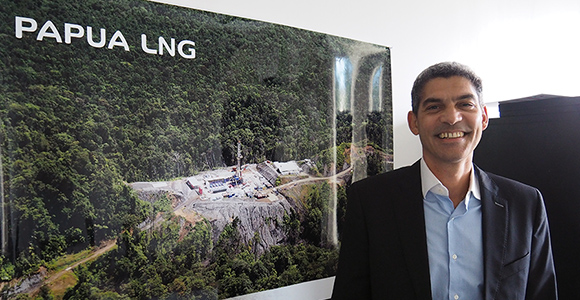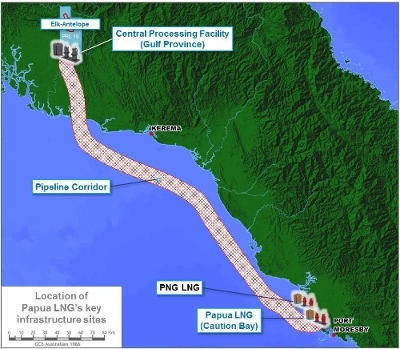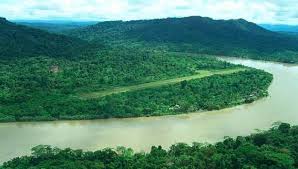France’s Total SA has confirmed its plans to commence construction for Papua LNG, the country’s next big liquefied natural gas project. Business Advantage PNG spoke with Philippe Blanchard, Managing Director of its PNG subsidiary, Total E&P PNG, to learn more about its race to start construction in 2018.

Total E&P PNG’s Philippe Blanchard
Business Advantage PNG: Earlier this month, your CEO Patrick Pouyanné paid a lightning visit to Papua New Guinea. He outlined Papua LNG as a US$10 billion project that would employ 10,000 workers. What is required to get the project to a green light from here?
Philippe Blanchard: As mentioned by our CEO, first we have to be able to tell the size of the reserves, which is why we are finalising the appraisal program. The plan is to complete the appraisal work by end of 2016 and be able to size the facilities immediately afterwards.
So, in 2017, we can move the project into FEED (Front End Engineering Design).
We have already started the social and environmental impact assessment studies. We have to perform surveys all over the project’s footprint.
That will take place between now and 2017. There are plenty of activities running in parallel.
It is a good project and the most important thing is to ensure that the project is cost-competitive and comes at the right time on the market.
The idea is to progress and be ready to launch the project in 2018 in order to take advantage of the current market by securing the best gas prices and by lowering the expenditures of the project. It will benefit both the developers and also all the stakeholders in Papua New Guinea and the people of Papua New Guinea.
In addition we think that a better window for gas marketing and monetisation will be present in the early 2020s. So, the timeline of this project should also be aligned with that.
Business Advantage PNG: Can you see any obvious obstacles that could prevent that from happening? For example, if the gas price keeps going lower, does that affect the project?’

Potential locations of the Papua LNG project’s two plants. The location of the plant at Caution Bay is already announced; a decision is expected before the end of 2016 on where the processing of gas will take place. Credit: Oil Search
Philippe Blanchard: It is a good project and the most important thing is to ensure that the project is cost-competitive and comes at the right time on the market. We believe in the price improvement in a long term because there will be a need for gas, and LNG in particular.
Business Advantage PNG: Given that the source of the gas is closer to the shore, is Papua LNG going to be a less complicated, less capital-intensive project than the ExxonMobil PNG LNG project?
Philippe Blanchard: These are two different projects with different challenges. Papua LNG is a good project and potentially it is a low cost project.
It is an important project for Papua New Guinea.
We will leverage all the advantages of the logistics and cost environment to make it a competitive project.
For Papua LNG, distance between the field and the proposed LNG plant is shorter; there is only one field involved but some impurities in the gas have to be treated.
Business Advantage PNG: Does that mean there will be more onshore processing of the gas before it is exported?
Philippe Blanchard: It is still under study and we have not yet firmed up our decision on where to treat and sweeten the gas before liquefaction and export. A decision would be made before the end of the year.
Business Advantage PNG: The PNG Government has the right to join the project. What signs have you received from the PNG government so far about its interest in doing this?
Philippe Blanchard: It is an important project for Papua New Guinea. From our discussions, they are interested. I believe that Kumul Petroleum Holdings, which is anticipated to hold this interest, is really keen on this project.
Business Advantage PNG: Gulf Province is in one of the less developed areas of Papua New Guinea. At this stage, what key infrastructure do you think needs to be in place?
Philippe Blanchard: I think it is important that medical and educational facilities are developed with the project going forward for the benefit of those people from the surrounding areas and the local communities who will be employed by the project contractors.

Purari River: Credit: Origin Energy
In addition, in terms of other infrastructure, our preferred option today is to use the Purari River to send all the equipment and material we need.
There will be phases in the project when we will need a large amount of skilled labor, at other periods we will need more unskilled labour.
We will also perform a full assessment on roads as well, as we would probably develop an airstrip for transportation of personnel.
Business Advantage PNG: A figure of 10,000 jobs was mentioned by M. Pouyanné. Of those jobs, how many are likely to be skilled jobs and how many unskilled?
Philippe Blanchard: It is too early to give a figure today. The ratio will evolve over time. There will be phases in the project when we will need a large amount of skilled labor, at other periods we will need more unskilled labour.
Business Advantage PNG: Once the facilities have started, it will be operated by a smaller team …?
Philippe Blanchard: Yes, after construction, an LNG plant employs usually about three or four hundred people. You need mainly operators to steer your installation—as well as skilled workers (electricians, mechanicians, etc) to perform the maintenance of the facilities.
But in our case, we will operate two plants with two operations and two maintenance teams: one for the upstream processing and one for the LNG processing.
Business Advantage PNG: Do you expect it to sell to similar markets to the PNG LNG gas?
Philippe Blanchard: We will start discussing gas marketing very soon with our JV partners and potential gas off-takers. We will take into account an evolving market and new players.
We are committed to making it happen. It is a key project for Total, in line with its LNG strategy.
We will look to provide gas mainly to the Asian market. It is clear that Japan, China, Korea, for instance, could be potential buyers. But other countries may be interested to buy gas from Papua LNG project.
Business Advantage PNG: How important is it to have the gas supply contracts in place before you start production?
Philippe Blanchard: It is really important because it gives you the confidence to incur all the expenses that are required. For such a project, you will look at financing by external lenders.
These will lend you money only if you show them that you will reimburse your loans. It is why you need to secure gas off-taking contracts early in your development process.
Business Advantage PNG: One issue is the political need to employ as many local people as possible in the project. That required ExxonMobil to build its Enterprise Centre to help locals skill up. Do you see a similar initiative being required?
Philippe Blanchard: There are universities, colleges, training centres (for example the Kumul Academy) that are already operating in Papua New Guinea.
We think that it is more efficient for everybody and less costly to build partnerships with the existing institutions, rather than building new centres.
Business Advantage PNG: So, is the project definitely going ahead?
Philippe Blanchard: Yes definitively. As a reminder, mid-2015, the location for the main infrastructures have been selected. Since then, the development studies as well as environmental and social base line surveys have progressed.
We are committed to making it happen. It is a key project for Total, in line with its LNG strategy. It allows us to pursue our growth in the Asia Pacific region.








Speak Your Mind